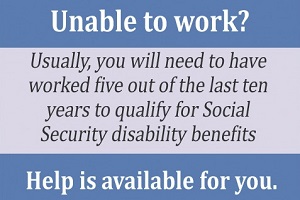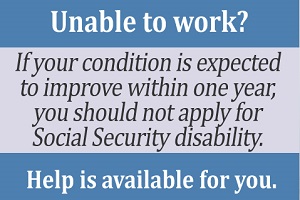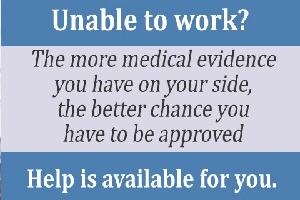
LAW FIRM BLOG
Improve Your Chances For Winning a Social Security Disability Claim
June 30, 2020
The application process is lengthy and complicated. To have the best possible chance of approval, listed here are several guidelines you should follow at various stages of the Social Security Disability Insurance (SSDI) application process.
Apply for the Appropriate Program
The Social Security Administration (SSA) has two programs that provide financial assistance to individuals with physical and/or mental disabilities. Claimants often confuse the two, and you must make sure to apply for the appropriate one, based on which one you qualify for.
Social Security Disability Insurance (SSDI) pays benefits to people who have worked and paid into the Social Security system through payroll deductions, and who have a disability that is expected to last at least one year or until they die.
Supplemental Security Income (SSI) provides benefits to individuals who are disabled but do not qualify for SSDI benefits, either because they have not worked for a long time or they have not entered the workforce. It is based on need and is generally for people with very few assets.
Another major difference between the two programs has to do with waiting times before benefit payments can start. SSDI has a five-month waiting period from the time a person becomes disabled before they can start receiving payments. SSI has no waiting period and recipients can get benefits the month they file their claim.
Health insurance provided is also an important difference. SSDI recipients must wait two years from the month they became eligible to get Medicare coverage, while SSI recipients can get Medicaid coverage as soon as they are approved for SSI benefits.
Understand the Program Criteria
Applicants should understand that the SSA follows a five-step checklist to determine if a person qualifies for benefits:
• You must not be gainfully employed, meaning you can’t be earning more than $1,260 per month.
• Your condition is severe, meaning it interferes with basic activities of work you are qualified to do.
• Your condition is on the SAA’s list of disabling conditions, and you will be disabled for more than a year or your condition will result in your death.
• You are not able to do the work you had been doing before the impairment.
• You can’t perform any other type of work.
Do Not Wait Too Long to File for Benefits
Even in a best-case scenario, it will take several months to get approval for SSDI benefits. And, with an initial rejection rate of 70 percent, it may take many months longer, sometimes as long as two to three years.
Start your application as soon as you think you qualify for benefits. If your condition improves, you can always withdraw your application. For SSDI benefits, you can only be paid up to one year before the date you initiate your application. Even if a judge were to find you became disabled 10 years ago, you can only get paid benefits for a maximum of one year before your protective filing date.
Do Not File for Benefits Prematurely
Conversely, some people apply for benefits too early in anticipation that their disabling condition will last for 12 months or longer. If you apply for benefits too soon, you could have a more difficult time proving that you are suffering from a long-term or permanent disability. In some cases, the claims representative or medical examiner may assume your condition will improve before you would qualify for the benefits you are applying for. Because of this, you should only apply for benefits once it has been clearly established your disability will indeed last for one year or more.
Do Not Apply when your Medical Condition is Not Severe Enough
Disability benefits are for people who will be out of work for one year or longer or that will result in death. Conditions that are only expected to keep you out of work for a few months, such as broken bones or pregnancy, do not qualify for SSDI or SSI.
Moreover, you can be denied benefits even when SSA acknowledges your medical conditions, usually because your conditions don’t preclude all work activity – only some work activity. To qualify for SSDI benefits, you are required to be unable to perform any substantial and gainful work activity.
Do Not Stop going to the Doctor
Because so much of qualifying for SSDI benefits rests with getting an appropriate and recent diagnosis for your disability, it is critical that you continue receiving medical care. Be sure to keep all of your appointments because the treatment notes will help to detail your condition. If you don’t go to the doctor or provide enough information, the SSA may decide your condition isn’t severe enough for benefits.
While the SSA may send you to one of their independent doctors for a “consultative examination,” generally the first two decisions on your claim are made entirely based on your medical records. You may eventually have to testify in front of a judge, and it is essential for the judge to have thorough and complete medical records to review before reaching a decision about your claim.
Follow your Doctor’s Prescribed Treatment
In most cases the SSA will view failure to follow treatment as being unwilling to help yourself and improve your condition, resulting in a denied claim. Not following treatment as prescribed can be seen as an indication that someone may be acting fraudulently. If the applicant is not trying to get better to regain entry into the workforce, it is sometimes difficult for an adjudicator to justify granting benefits.

Provide Enough Medical Evidence to Support Your Claim
Sometimes the SSA will deny disability benefits because there is not enough medical evidence to prove your condition will hinder your ability to work. If this is why your claim is denied, you should work closely with your doctor to document your limitations and appeal the decision.
Medical records are the most important part of your claim. The more that evidence can show a clear progression of an illness, or a clear start date of disability, the better. The more comprehensive the records, the better.
Gathering records can be time-consuming, but it is critical that you be as thorough as possible. Make sure that all the records have contact information in the event the examiner needs to contact your medical professional. Also make sure they are current, complete, and legible.
Because evidence statements from your doctor carry the most weight, have your treating physician complete a Residual Functional Capacity Form to clearly and plainly document your current disabling condition. RFCs are not just for physical issues. If you are being treated for mental disorders, have your psychologist or psychiatrist complete an RFC on your behalf as well.
Too much information is better than not enough when it comes to medical documentation. If you are in doubt whether to include certain information or not, it’s usually best to add it.
Consult with a Medical Specialist
Before you file, meet with a specialist who treats your specific kind of disabling condition. Claims representatives and examiners place great weight on what medical professionals diagnose on your behalf, and a supporting diagnosis from a specialist will be influential in determining your eligibility.
Communicate with your Doctor before Submitting a Claim
Discuss your impending application with your doctor beforehand to make sure they will support your upcoming claim. If your physician is not sympathetic to your situation, it may work against you. If your doctor is not willing to support your efforts, it might be best to look for one who will.
List All of your Medical Impairments
It is not only necessary to gather information on the most disabling of your conditions, but to provide records and documentation on all of your disabling conditions. For example, if you have back pain, cancer, or arthritis, you may also be suffering from depression, high blood pressure, or other secondary conditions as well. It is a requirement for the SSA to consider every one of your impairments singly and in combination with each other. Listing each condition is important, even if it does not seem as disabling as the others.
Meet Basic Non-medical Requirements
If you earn income of more than $1,260 per month (in 2020) or you don’t have sufficient work credits, you will receive a technical denial on your SSDI application. Under these conditions, SSA won’t even consider your supporting medical evidence.
Evaluate if your Disability is Primarily Due to Alcohol or Drug Use.
If you are suffering from alcohol or drug abuse, and it is the primary reason that prevents you from working, you will not be able to collect SSDI benefits. However, you can still receive benefits for conditions caused by alcohol or drugs, but it just can’t be the main contributing factor to your illness.
What this means is that if you have developed disabling conditions due to alcohol or drug abuse, such as cirrhosis or other related diseases, then your claim may be approved. However, if the reason you can’t work is because you are taking drugs or you are an alcoholic, meaning you can’t function properly in a work environment, but are otherwise healthy, then your claim will be denied.
Do Not Assume you will be Granted Benefits in a Short Time Frame when you Apply
Many people underestimate the stringent requirements for getting a claim approved. As such, they don’t plan for a long appeal process. Because of the high initial rejection rate, you should assume it will take several months, if not a couple of years, for you to start receiving SSDI benefits, if at all.
Do Not File a Claim While You Are Still Working
You may show some income, but SSA will not even evaluate your claim if you are working and earning income over a level that is considered “substantial gainful activity.” This amount is currently $1,260 per month, before taxes. If you show income over this amount, you will be issued a technical denial and SSA will not even consider your medical evidence.
There’s no formal rule against filing a claim while you are still working, but since the intended purpose of the programs is to financially assist you because you are too disabled to perform substantial gainful work, there’s a good chance your claim will not be approved if you do so. If you are working and you file an SSDI application, you are contradicting yourself and your claim that you are unable to work.
Do Not Understate or Exaggerate the Impact of your Disability
You will be relating your account to experienced claims representatives and medical examiners. They have processed and evaluated hundreds, if not thousands, of cases and will be able to discern when a narrative does not seem true. Do not overstate your case.
In contrast, some people understate the extent of their disabilities due to factors such as embarrassment, pride, complacency, and habituation. Be honest at all times and tell the complete truth to SSA personnel, healthcare providers, attorneys, judges, and others who may be involved in deciding your case.
Do Not Apply for SSDI and Unemployment Insurance
Unemployment Insurance is for people actively searching for jobs. SSDI is for people who cannot work. The two programs contradict each other; they are not interchangeable. You’re either seeking work or you can’t work — apply for the program applicable to your situation.
One of the key requirements for collecting Unemployment Insurance is that you must be ready, willing, able, and available to work. This requirement is consistent no matter what state you live in.
If a judge or an SSA analyst learns that you are attempting to collect benefits from both programs, you will have some explaining to do, and chances are you will be unsuccessful at it, meaning you will be denied benefits from one program or the other or both.

Closely Oversee the Gathering and Delivery of your Medical Documentation
Disability Determination Services (DDS) may send you to a consultative examiner to gather more information, but you shouldn’t rely on this doctor to provide a comprehensive analysis of your condition. Generally, they will only provide what the disability examiner requests.
Make sure DDS has as much detailed information about your condition as possible by providing your own records. Gather everything that you can to support your claim. Chances are it will take a fair amount of time and effort, but if your goal is to collect SSDI benefits, you must be willing to take responsibility for your own claim.
Your Medical Records Must Match Your Statements and Testimony
The SSA puts a great amount of emphasis on medical records, and they will want to see consistency between what is in those records and what you verbally tell them about your condition. It will raise skepticism if you do not convey the same information as your records indicate.
Act Quickly in Responding to Requests for Additional Medical Records.
If you are initially rejected, chances are additional records will be required if you plan to file an appeal. It is critical to note that you only have 65 days to file an appeal. And your impending deadline does not necessarily motivate those who hold your medical records. It can sometimes take weeks to get important files from all of your medical providers. Act immediately and assume you’ll need a long lead time to get what you need.
Cooperate with SSA
If you refuse to give the SSA permission to obtain your medical files, or you don’t appear for consultative exams, you will be denied benefits. Do whatever is asked of you to give you the best chance for approval.
Requests for more information are ordered because there is not enough medical evidence currently in your file to support your claim. The SSA requires proof in the form of an evaluation from one or more doctors. Cooperate fully or expect to be denied benefits.
Complete All of the Claim Forms
Yes, the process is exacting and time-consuming. And yes, there are a lot of forms to fill out. Don’t get frustrated or discouraged. Complete everything, even if it seems redundant. There’s a reason for every form, even if it doesn’t make complete sense to you. Patience and attention to details when applying are crucial.
Make it Easy for the SSA to contact you
If they can’t locate you, they can’t contact you, whether it’s to ask questions, request records, or discuss any aspect of your claim. A denial is sure to follow. If you change your address or your phone number, quickly update the SSA with your new information.
Do Not Expect to Collect Benefits if You’re Currently Incarcerated.
You cannot earn disability benefits if you are currently in jail or prison. That’s not to say you can’t get approved and start earning them once you are released; you just can’t receive them while behind bars.
Additionally, if your condition is the result of, or was made worse by, committing a felony, you will not be eligible for benefits. For example, if you committed a robbery and were shot by the police as a result, causing you to become paralyzed, this would be considered a disqualifying event.
Also note that if you are on parole or probation, you are not entitled to benefits for any month you violate the terms of your release.
Do Not Commit Fraud
If you are trying to collect SSDI benefits and you get caught trying to defraud the government, not only will you be denied benefits, but you may also be prosecuted by the federal government.
Be honest at all times when completing forms, and providing information to to claims representatives, medical examiners, doctors, lawyers, and judges. Sooner or later, if you lie, you will get caught.

Get Legal Assistance
Claimants with legal representation are much more likely to be approved for benefits than those without. Lawyers know what documentation the SSA needs, and they have experience with the application and appeals process.
The period leading up to the hearing as well as the actual hearing itself are generally when an attorney is the most valuable for applicants. In addition to monitoring any communications from the SSA, the attorney will review all the files that are currently part of your claim and update them so that you have the most current medical records to support your disability claim.
Under Federal law, all Social Security attorneys must work on a contingency basis, meaning he or she will only get paid if you win benefits. In that case, he or she will receive 25% of the back pay, if any, up to $6,000.
Regularly Check the Status of your SSDI Application.
After you file your application, regularly check on its status. How often you check may be determined by what stage of the process your claim is at, i.e., initial application, reconsideration, disability hearing, etc. How often you check will also depend on whether or not you have an attorney representing you, in which case it is their task to oversee your application. But this does not completely absolve you of the responsibility. Inquire if your paperwork was received, is incomplete or your case has been denied. The sooner you know, the sooner you can correct any errors or deficiencies.
Do Not Miss Deadlines
If you do at any point in the process, you will need to start your claim all over again. That alone should be enough motivation to avoid this costly mistake.
Do Not File a New Application after a Denial. Appeal, Appeal, Appeal.
If you file a new application, it will most likely be denied again. Your chances of approval significantly improve during the appeals process.
Many claimants think they should fill out a new disability claim, rather than appeal a currently denied claim. Unfortunately, this may create doubt for a claims representative who sees that you applied for SSDI and were denied benefits before.
Although an appeal may seem onerous, it is generally better to go through the appeals process rather than starting a new claim if you have been previously denied.
Filing a reconsideration is the only way to move your claim through the appeals process. Statistically, claimants have a better chance once they are able to explain their medical conditions directly to a judge.
Reconsideration appeals are generally decided more quickly than initial claims because most of the time all the pertinent records have already been gathered. However, to improve the chances for approval, an applicant should also make every effort to try and correct the error that produced the initial rejection, usually by submitting new medical evidence or other similar documentation.
Seek a Compassionate Allowance, if Applicable, to get Benefits more Quickly
It can take several months to be approved for SSDI benefits. But the SSA is required to provide benefits as quickly as possible if you have an extremely serious medical condition.
These conditions include some types of cancers, rare and terminal disorders, dementia, and Alzheimer’s disease, among others. Collectively, they are known as Compassionate Allowances (CAL) and are a subset of the Listing of Impairments that the SSA uses to define what conditions qualify for SSDI benefits. Persons with conditions listed as Compassionate Allowances generally have to provide much less medical information, and can get approved in a matter of weeks.
There are about 220 qualifying conditions and the current list of those Compassionate Allowances can be found on SSA’s website.
Applicants should go through normal submission procedures and the SSA will identify and expedite applications with a CAL condition. How long approval takes depends on how quickly medical records can be obtained from an applicant’s doctors.
Persevere
Lastly, as you go through the entire application process, persevere. Winning benefits can be long and arduous. But understand that while nearly 70 percent of initial claims are denied, the majority of claimants who persist eventually get approved.



